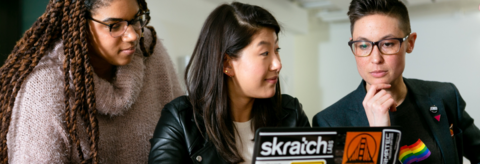
Inclusion and belonging
CEE’s commitment to Indigenous relations (IR), equity, diversity and anti-racism (EDI-R)
In alignment with the University of Waterloo, Co-operative and Experiential Education (CEE) recognizes that diverse voices and perspectives enrich our unit and the experience of our students and employers. We commit to providing work-integrated learning (WIL) programs and career education with a human-centered approach to meet the needs of each student’s lived experiences. We aim to work towards equity in our systems to eliminate barriers and strive for a culture of belonging for every individual, even when it is complex and challenging.

Focused support
CEE has co-op student experience manager roles dedicated to supporting students while on campus. CEE encourages and enables all staff, regardless of their role, to create safe spaces where people (students, staff and employers) feel included and that they belong.
Co-op student experience manager — EDI & anti-racism
This role helps co-op students navigate challenges, barriers and any accommodation needs during their work terms, with a focus on equity, diversity, inclusion, accessibility and anti-racism. The role has key responsibilities that include support for students, staff and faculty, and employers. For example:
For students
-
Provide one-on-one guidance to help students navigate identity in the workplace, access accommodations, and build self-advocacy skills.
-
Collaborate with campus partners, including AccessAbility Services and the Office of Equity, Diversity, Inclusion and Anti-Racism (EDI-AR), to ensure students receive co-ordinated and culturally responsive support.
-
Connect students with equity-focused employers and inclusive workplaces that align with their values and experiences.
-
Develop and deliver workshops such as Identity in the Workplace and Equity-Focused Career Prep, helping students understand and overcome systemic barriers in hiring and workplace experiences.
-
Co-chair the Student Equity Advisory Group (SEAG), a paid student group that provides feedback and recommendations on CEE initiatives to ensure diverse perspectives shape departmental priorities.

For employers
-
Support employers in developing equitable hiring and supervision practices that promote inclusion in the workplace.
-
Collaborate with employers to review job postings for inclusive and accessible language.
-
Partner with employers and campus units to host equity-focused information sessions and events that highlight inclusive employment opportunities.
For staff and faculty
-
Lead the Inclusion Connection Network (ICN), a space for CEE staff to discuss equity trends, share promising practices and collaborate on inclusive approaches to student support.
-
Consult with CEE staff and faculty on student cases and strategies to embed equity, accessibility, and anti-racism in advising, programming and employer engagement.
-
Provide tools, training and guidance to help staff address equity-related challenges and enhance inclusive practices across the department.
Co-op student experience manager - Indigenous Relations
This role collaborates with students, faculty and employers to address and reduce barriers faced by Indigenous students, fostering a more meaningful and inclusive co-op experience. The role has key responsibilities that support students, staff and faculty, and employers. For example:
For students
-
Connect students with Indigenous employers to secure a more culturally relevant position or a position closer to their home community/place of residence.
-
Connect students with larger non-Indigenous employers seeking to recruit Indigenous talent.
-
Provide advocacy, check-ins and guidance throughout students’ work terms.
-
Act as part of the circle of care for Indigenous students by collaborating with campus partners and maintaining strong connections with the Office of Indigenous Relations (OIR).

For staff and faculty
-
Educate staff and faculty about the unique challenges and systemic barriers faced by Indigenous students.
-
Foster relationships between CEE, OIR and the Indigenous student body.
-
Assist CEE’s industry relations team with Indigenous recruitment processes and strategy.
For employers
-
Provide support to Indigenous employers navigating the administrative requirements of the University of Waterloo’s new employer process.
-
Collaborate with Indigenous and non-Indigenous employers to coordinate and host information sessions tailored to Indigenous students in partnership with OIR.
-
Promote job and career opportunities to the Indigenous students to enhance visibility and engagement.


CEE student equity advisory group
The CEE student equity advisory group (SEAG) plays a crucial role in shaping services and support for students. SEAG provides recommendations and advice related to developing and implementing equity-driven processes and actions to eliminate systemic barriers that students from racialized, marginalized and excluded communities face within CEE. This advisory group aligns CEE’s activities with other institutional efforts to eliminate systemic barriers, applying an intersectional lens.

Training
CEE staff participate in ongoing awareness training sessions provided by the University throughout the year. These sessions aim to improve EDI-R, IR, and accessibility decision-making in their respective areas. CEE staff also participate in training and professional development sessions led by external vendors and industry experts in EDI-R and IR.

Awareness-building activities
CCD offers rotating workshops specifically targeted to students from racialized, marginalized, and excluded communities. Examples include workshops designed to support students with disabilities in navigating employment challenges and for students experiencing challenges with their mental health.

Inclusive communications and events
CEE works to incorporate EDI-R and IR into CEE events and displays an inclusive statement to ensure CEE events are a safer space for all involved. We practice inclusive communications in line with University’s brand and best practices. Each year, CEE recognizes co-op employers with the Employer Impact Award for Impact in Inclusion and Belonging. The award celebrates employers who create inclusive, supportive and thriving workplaces for co-op students.